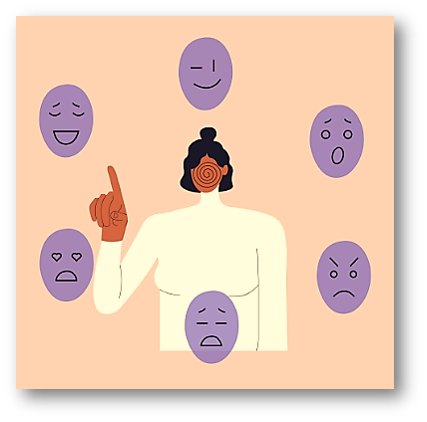
Mood swings
mood swings are rapid shifts in mood or emotional state. They can range from mild to severe and can occur in response to various triggers, such as stress, changes in the environment, or hormonal fluctuations. It can be a normal part of life, but when they become extreme or occur frequently, it can interfere with daily functioning and impact relationships and overall well-being.
Additionally, mood regulations can be a symptom of certain mental health conditions, such as bipolar disorder, which is characterized by periods of elevated or irritable mood (called mania) and periods of depressed mood. It can also be a side effect of certain medications or medical conditions. Therefore, if you’re experiencing mood fluctuations that are severe or affecting your daily life, it is important to seek help from a mental health professional. Fortunately, with proper treatment, it is possible to manage mood swings and improve your overall quality of life.
DEALING WITH MOOD CHANGES!!
Sudden mood changes can be a normal and natural part of life. They are often caused by temporary stressors or changes in the environment. However, if you’re experiencing sudden and severe changes in mood that interfere with your daily life and relationships, it could be a sign of a mental health condition, such as bipolar disorder. On the other hand, it is important to keep in mind that there may be other factors contributing to mood changes, and it is always worth discussing any concerns with a mental health professional.
If you’re concerned about sudden changes in your mood, it’s important to speak with a mental health professional for a proper evaluation and treatment. They can help you identify the underlying cause of your mood changes and develop a plan to manage them. In the meantime, there are things you can do to help cope with sudden mood changes. For example, maintaining a healthy lifestyle, including a balanced diet, regular exercise, and sufficient sleep, can all be helpful in managing mood. Additionally, practicing relaxation techniques, such as deep breathing or mindfulness meditation, may also be beneficial. Lastly, it can be helpful to have a supportive network of friends and family to turn to during times of emotional difficulty.
Practice self-care:
Take care of your physical and emotional needs by getting enough sleep, eating a healthy diet, and engaging in activities that bring you joy and relaxation, such as exercise or hobbies.
Seek support:
Talk to a trusted friend, family member, or mental health professional about your feelings and seek support when you need it.
Practice relaxation techniques:
Try techniques such as deep breathing, progressive muscle relaxation, or mindfulness meditation to help you manage stress and regulate your mood.
Identify and manage stressors:
Try to identify the things that trigger your mood changes and find ways to manage or reduce these stressors. This may involve seeking support, setting boundaries, or finding healthy coping mechanisms, such as exercise or meditation.
Seek professional help:
If your mood changes are severe or interfere with your daily life. Consider seeking help from a mental health professional. They can provide support, guidance, and treatment options to help you manage your mood changes.
MOOD SWINGS IN CERTAIN SPECIFIC CONDITIONS!!

Mood swings can be a symptom of certain mental health conditions, such as:
Bipolar disorder:
This is a mood disorder characterized by periods of elevated or irritable mood (called mania). That is a period of depressed mood. They are common symptoms of bipolar disorder.
Borderline personality disorder (BPD):
This is a mental health condition characterized by unstable moods, behaviors, and relationships. People with BPD may experience sudden shifts in mood. Often in response to perceived abandonment or rejection.
Post-traumatic stress disorder (PTSD):
This is a mental health condition that can develop after a person experiences a traumatic event. People with PTSD may have mood swings and experience changes in their emotional state.
Premenstrual dysphoric disorder (PMDD):
This is a severe form of premenstrual syndrome (PMS). That can cause mood swings and other emotional symptoms a week or two before a woman’s period.
Substance use disorders:
Mood swings can be a side effect of substance abuse or addiction. https://lifebiologs.com/a-cup-of-tea-makes-everything-better-but-control-is-needed/
.
If you’re experiencing mood swings and think you may have a mental health condition, it’s important to speak with a mental health professional for a proper evaluation and treatment. They can help you manage your mood swings and improve your overall quality of life.
TREATMENT OPTIONS FOR MOOD SWINGS!!
There are several treatment options available for mood swings, depending on the underlying cause and severity of the symptoms. Some common treatment options include:
Psychotherapy:
Talking to a mental health professional, such as a therapist or counselor, can help manage mood swings. There are several types of psychotherapy that may be effective in treating your moods, including cognitive-behavioral therapy (CBT), dialectical behavior therapy (DBT), and interpersonal therapy (IPT). Moreover, these therapies can be helpful in addressing any underlying issues contributing to your mood swings and teaching you coping skills to manage them in the future.
Medication:
In some cases, medication may be used to help stabilize mood and reduce the frequency and severity of mood swings. Common medications used to treat mood swings include mood stabilizers, such as lithium and valproic acid, and antipsychotics.
Lifestyle changes:
Making changes to your daily routine and habits, such as getting regular exercise, getting enough sleep, and eating a healthy diet, can help regulate mood.
Supportive care:
Receiving support and guidance from friends, family, or a support group can help manage mood. Additionally, it’s important to work with a mental health professional to determine the most appropriate treatment plan for your specific needs and circumstances. They can help you identify the underlying cause of your problem and develop a plan to manage them effectively. Furthermore, it is important to follow the treatment plan recommended by your mental health professional, as this can be crucial for managing mood and improving overall well-being.
THERAPY FOR MOOD REGULATION!!
Psychotherapy, also known as talk therapy, can be an effective treatment for mood regulation. Several types of therapy may help manage mood swings, including:
Cognitive-behavioral therapy (CBT):
This therapy focuses on changing negative thought patterns and behaviors that contribute to mood swings.
Dialectical behavior therapy (DBT):
The therapy is designed to help individuals with mood-related disorders and other emotional problems regulate their emotions and improve their relationships.
Interpersonal therapy (IPT):
The type of therapy focuses on helping individuals identify and address problems in their relationships and social interactions that may be contributing to mood swings.
Psychodynamic therapy:
This type of therapy helps individuals understand and address the underlying emotional conflicts and issues that may be causing mood swings.
It’s important to work with a mental health professional to determine the most appropriate type of therapy for your specific needs and circumstances. They can help you develop strategies for managing and regulating your mood and improving your overall quality of life.
BEST FOOD OPTIONS FOR SUDDEN MOOD REGULATIONS!!

Here are a few food options that may help regulate mood: “There is no one-size-fits-all solution for regulating mood, and the best approach will depend on the individual and their specific needs and circumstances. However, certain foods may be helpful in managing mood due to their nutrient content and potential effects on brain function.:
Complex carbohydrates:
These types of carbohydrates, such as whole grains, fruits, and vegetables, can help increase the production of serotonin, a neurotransmitter that helps regulate mood.
Omega-3 fatty acids:
These fatty acids, found in fatty fish, nuts, and seeds, may have anti-inflammatory effects and may help manage mood and other mental health symptoms.
Protein:
Lean sources of protein, such as chicken, turkey, and beans, can help stabilize blood sugar levels and support brain function, which may help regulate mood.
B vitamins:
B vitamins, found in whole grains, nuts, and seeds, are involved in brain function and may help manage mood.
SWEETS AND MOOD SWINGS!!

There is some evidence to suggest that certain foods, including sweets, may have an impact on mood. For example, sugary foods may cause a rapid increase in blood sugar. followed by a crash, which can contribute to mood regulations. On the other hand, some research suggests that sweets and other comfort foods may have temporary mood-boosting effects. Nemeroff, C. B., & Owens, M. J. (2002). Treatment of mood disorders. Nature neuroscience, 5(11), 1068-1070. This is due to the release of endorphins, a chemical in the brain that produces feelings of pleasure.
CONCLUSION
Remember that diet is just one aspect of overall health and well-being. It is important to address any underlying mental health concerns through therapy and other appropriate treatment options. However, while it’s okay to indulge in sweets occasionally, it is important to eat a balanced and varied diet to ensure you’re getting all the nutrients your body needs. In addition, it is worth noting that while certain foods may have potential mood-regulating effects, they should not be used as a replacement for proper mental health treatment. https://lifebiologs.com/a-cup-of-tea-makes-everything-better-but-control-is-needed/Similarly to manage blood sugar levels by eating regular, balanced meals and avoiding large amounts of sugary foods.
MOTIVATION
“If you’re struggling with moods problem. it’s important to remember that you’re not alone. There are resources available to help you. It can be helpful to talk to a mental health professional. Such as a therapist or counselor. Tell them about your feelings and get support and guidance in managing your mood regulations. You may also find it helpful to try self-care practices. Such as exercising, getting enough sleep, and eating a healthy diet. These can all help to regulate your mood.”
KEYWORDS: Managing mood swings, Dealing with mood changes, Coping with emotional instability, Tips for managing mood swings, Strategies for stabilizing mood, Treatment options for mood swings, Therapy for mood regulation, Mood swings, and mental health, Mood swings treatment, Managing mood swings, Mood swings and bipolar disorder, Mood swings and borderline personality disorder, Mood swings and post-traumatic stress disorder, Mood swings, premenstrual dysphoric disorder, Mood swings and substance use disorders, Mood swings and psychotherapy, Mood swings, and medication,
REFERENCES:
- Akiskal, H. S., & Van Valkenburg, C. (1994). Mood disorders. In Diagnostic interviewing (pp. 79-107). Springer, Boston, MA.
- Drevets, W. C. (2003). Neuroimaging abnormalities in the amygdala in mood disorders. Annals of the New York Academy of Sciences, 985(1), 420-444.
- Nemeroff, C. B., & Owens, M. J. (2002). Treatment of mood disorders. Nature neuroscience, 5(11), 1068-1070.


It’s important to remember that diet is just one aspect of overall health and well-being, and it’s important to address any underlying mental health concerns through therapy and other appropriate treatment options. While it’s okay to indulge in sweets occasionally, it’s important to eat a balanced and varied diet to ensure you’re getting all the nutrients your body needs. It’s also important to manage blood sugar levels by eating regular, balanced meals and avoiding large amounts of sugary foods.
Pingback: HORMONES MAKE YOU FALL IN LOVE OR HATE!! - Life Biologs
Pingback: STOP OVERTHINKING-THINK LESS, LIVE MORE!!! - Life Biologs